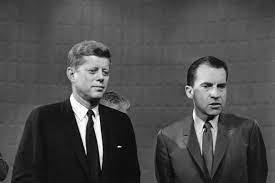The 1960 United States presidential election was a pivotal moment in American history, pitting John F. Kennedy against Richard Nixon in a closely contested race that would come to symbolize the dawn of a new era in American politics.
John F. Kennedy, the Democratic candidate, was a charismatic senator from Massachusetts with an Ivy League education and a vision for a more progressive America. He promised to bring fresh leadership and vigor to the nation. His eloquent speeches and appeal to a younger generation of voters made him a dynamic force in the race.
Richard Nixon, the Republican candidate and Vice President at the time, had a long and distinguished political career, having served as a congressman, senator, and as Dwight D. Eisenhower’s vice president. He presented himself as the experienced candidate with a strong foreign policy background. However, Nixon struggled to overcome his association with the Eisenhower administration, which had become somewhat unpopular by 1960.
The first-ever televised presidential debates played a pivotal role in the election. Kennedy’s poise and telegenic presence contrasted with Nixon’s nervous demeanor, creating a stark visual contrast that favored Kennedy. This factor significantly influenced public perception and contributed to Kennedy’s narrow victory.
The issues of the day were varied and included the Cold War, civil rights, and the economy. Kennedy’s stance on civil rights and his promise to create a “New Frontier” resonated with many, especially African-American voters. Meanwhile, Nixon’s emphasis on his foreign policy experience and the fight against communism appealed to conservative voters.
Ultimately, the 1960 election was one of the closest in American history, with Kennedy winning by a mere 0.1% of the popular vote. Kennedy’s victory marked a turning point, as he became the first Catholic president and ushered in a new era of youthful, energetic leadership. His administration would face challenges such as the Cuban Missile Crisis and the beginning of American involvement in Vietnam.
In conclusion, the 1960 presidential election was a defining moment in American politics, showcasing the power of television in shaping public perception. Kennedy’s narrow victory represented a shift towards a new generation of leadership, and his presidency left a lasting impact on the United States during a tumultuous era in history.
newshub



Recent Comments